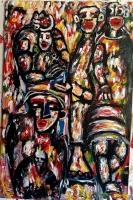 Dear racialized friend, we both feel the weight, so let me end here as it’s getting late, when we talk about racism, whiteness and privilege, don't ever forget to create contexts, don't repeat the same claims as if they were refrains, don't talk about the system as if it operated and oppressed in the same way everywhere, with no aims or changes or such affairs, or as if the context of blacks in the USA was the same as that of blacks in Portugal, and of blacks in Brazil, and from there to blacks in Guinea.
Dear racialized friend, we both feel the weight, so let me end here as it’s getting late, when we talk about racism, whiteness and privilege, don't ever forget to create contexts, don't repeat the same claims as if they were refrains, don't talk about the system as if it operated and oppressed in the same way everywhere, with no aims or changes or such affairs, or as if the context of blacks in the USA was the same as that of blacks in Portugal, and of blacks in Brazil, and from there to blacks in Guinea.
To read
04.06.2025 | by Marinho de Pina